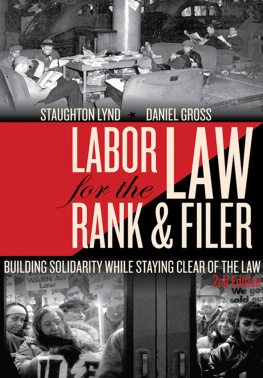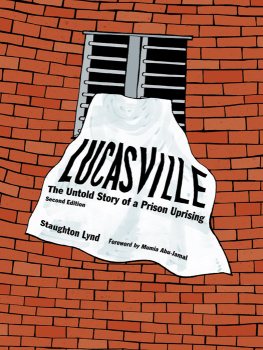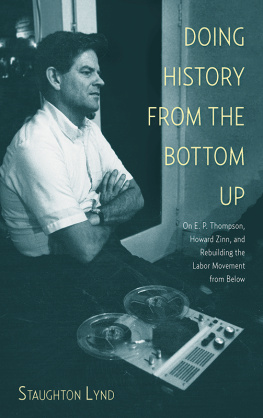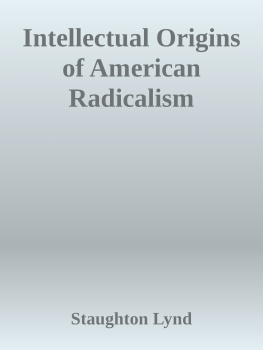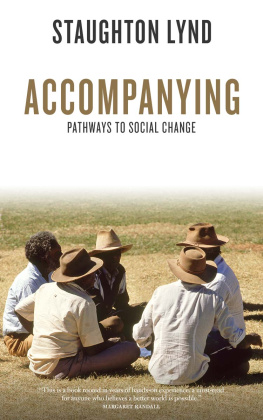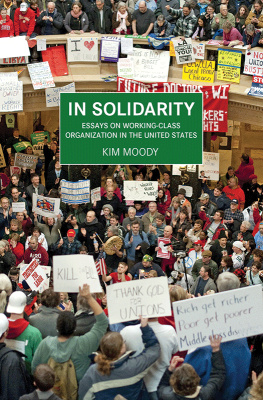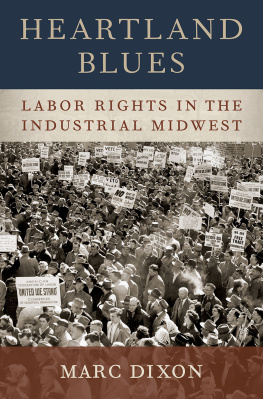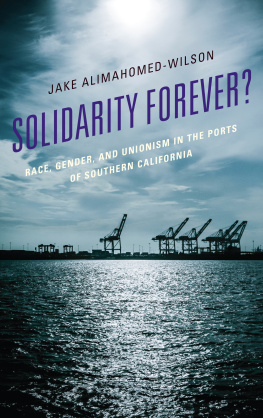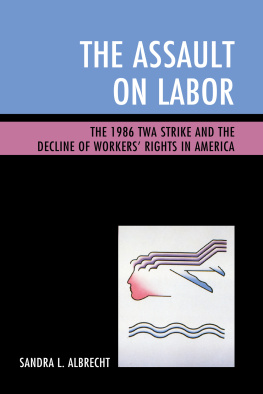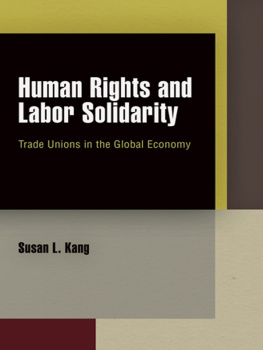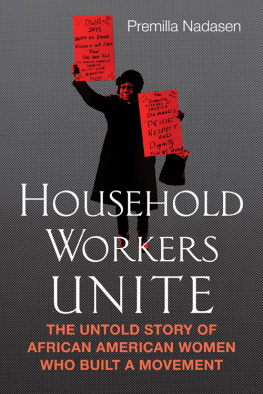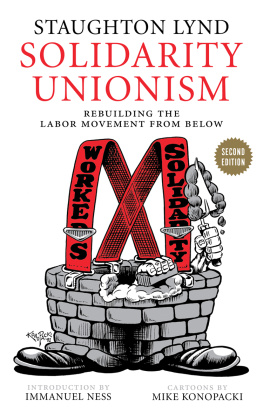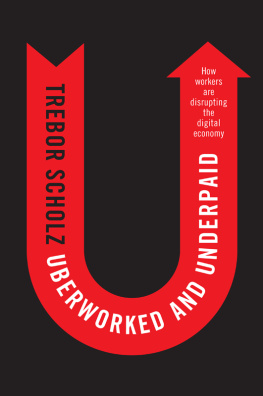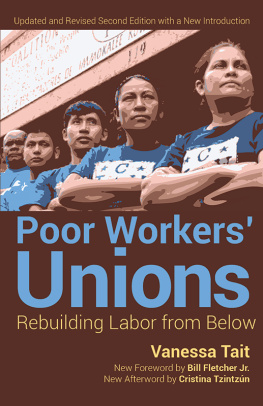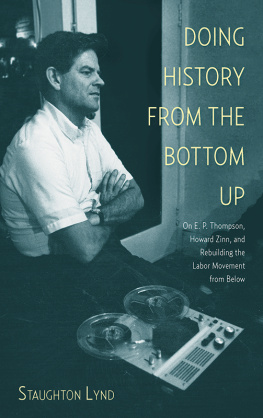LABOR LAW FOR THE RANK&FILER:
BUILDING SOLIDARITY WHILE STAYING CLEAR OF THE LAW
By STAUGHTON LYND&DANIEL GROSS
Workers rights are under attack on every front. Bosses break the law every day. For 30 years Labor Law for the Rank and Filer has been arming workers with an introduction to their legal rights (and the limited means to enforce them) while reminding everyone that real power comes from workers solidarity.
Alexis Buss, former General Secretary-Treasurer, Industrial Workers of the World
As valuable to working persons as any hammer, drill, stapler, or copy machine, Labor Law for the Rank and Filer is a damn fine tool empowering workers who struggle to realize their basic dignity in the workplace while living through an era of unchecked corporate greed. Smart, tough, and optimistic, Staughton Lynd and Daniel Gross provide nuts and bolts information to realize on-the-job rights while showing us that another world is not only possible but inevitable.
John Philo, Legal Director, Maurice and Jane Sugar Law Center for Economic and Social Justice
Some things are too important to leave to so called experts: our livelihoods, our dignity and our rights. In this book, Staughton Lynd and Daniel Gross have provided us with a very necessary, empowering, and accessible tool for protecting our own rights as workers.
Nicole Schulman, co-editor, Wobblies!A Graphic History and World War 3 Illustrated

LABOR LAW FOR THE RANK&FILER:
BUILDING SOLIDARITY WHILE STAYING CLEAR OF THE LAW
SECOND EDITION
Copyright 2011 Staughton Lynd & Daniel Gross
This edition copyright 2011 PM Press
All Rights Reserved
Special thanks to Alice Lynd
Cover by Daniel Meltzer
Cover photo by Anna Karewicz
Published by:
PM Press, PO Box 23912, Oakland, CA 94623
www.pmpress.org
ISBN: 978-1-60486-419-9
Library Of Congress Control Number: 2010916478
10 9 8 7 6 5 4 3 2 1
Printed in the USA on recycled paper.
TABLE OF CONTENTS
CHAPTER I
On Being Your Own Lawyer
CHAPTER 2
Where Do Workers Rights Come From?
CHAPTER 3
The Basic Labor Laws
CHAPTER 4
A Rank and Filers Bill of Rights
CHAPTER 5
Practicing Solidarity Unionism
CHAPTER 6
Conclusion: Another World Is Possible
ACKNOWLEDGMENTS
T he authors wish gratefully to acknowledge the assistance of Professors Jennifer Gordon of Fordham Law School and James Gray Pope of Rutgers Law School. Each carefully read a draft, and suggested additions and corrections.
We also appreciate the diligent research assistance of Sheila Maddali, Elizabeth McCurry, and Cristen Sargent.
Alice Lynd not only put the text in final form for publication but, along the way, made suggestions drawn from her own experience in employment law.
All remaining shortcomings having to do with strategic perspectives, tactical suggestions, citation to and characterization of precedents, or otherwise, are the responsibility of the authors.
CHAPTER I
ON BEING YOUR OWN LAWYER
MARTY AND STAN
T his little book first appeared in 1978. A revised edition was published in 1982.
Two working-class intellectuals inspired the original booklet. The late Marty Glaberman spent years working for automobile companies in and around Detroit. He belonged to a radical group associated with the West Indian author and intellectual C.L.R. James. In 1952 Marty published a pamphlet entitled Punching Out There he argued that the characteristic achievement of the Congress of Industrial Organizations (CIO) was a collective bargaining agreement that contained a no-strike clause. Inevitably, Marty said, the union shop steward must enforce the contract, including its prohibition of work stoppages and wildcat strikes: the union steward becomes a cop for the boss.
During those same years, the late Stan Weir began his remarkable journey as a sailor, automobile worker, truck driver, and longshoreman. One of his basic ideas was that when human beings labor together they naturally create what Stan called informal work groups. arise in the workplace and cannot be transferred to a union hall away from the plant. The informal work group fosters workers self-activity in the form of group grievances, wildcat work stoppages, and local general strikes.
Stan Weir also framed the question to which this booklet seeks to respond. When you go to work you ordinarily leave your constitutional rights as a citizen in the glove compartment of your car on the employers parking lot. Is there anything in the law that can help us to enjoy as workers the rights to speak, to associate, and so on, that we have, at least on paper, away from work? Together with another longshoreman, Robert Miles, Stan formed a small publishing house, Singlejack Books, which printed the first two editions of Labor Law for the Rank and Filer.
The authors of this new edition generally endorse the ideas of our departed comrades, Marty Glaberman and Stan Weir. Daniel Gross is an organizer with the Industrial Workers of the World (IWW) on the campaign to organize Starbucks. A former Starbucks barista and a graduate of Fordham Law School, he is the Founding Director of Brandworkers International, a non-profit organization for retail and food employees. Staughton Lynd specialized in employment law as an attorney for Legal Services in Youngstown, Ohio, and has written, among other things, Solidarity Unionism: Rebuilding the Labor Movement from Below (Chicago: Charles H. Kerr, 1992). Since his retirement in 1996 he has advocated for prisoners.
ON BEING YOUR OWN LAWYER
B asically, this is a do-it-yourself book. Its goal is to help you deal more effectively with the law: to protect yourself when the law is against you, and to get more accomplished when the law is on your side.
Our point of view is that whenever a problem can be solved without the help of a lawyer, do it. Besides being expensive the law takes a long time. And it is written and administered by individuals who for the most part do not understand or sympathize with the experience of working people.
Lawyers, like doctors, make their profession seem more mysterious than it really is. They use big words when short words would do just as well. They encourage workers to feel helpless unless a lawyer is representing them.
The assumption of this book is that, with a modest orientation, anyone able to read can make a preliminary assessment of a labor law problem. Dr. Spock takes the same approach to medicine in his famous book on baby care. He says to the mother or father of young children: if your child shows symptom A, watch carefully to see if B or C appear as well; if they do, call a doctor; if they dont, you can take care of the child yourself.
This book views your problems in labor law similarly. Our aim is not to teach you the law. It is to teach you how to teach yourself at least the broad outlines of the law, so that you can diagnose a labor law problem, just as you might size up whats wrong with the car engine.
To know what the law is about a problem, you have to know not only the text of the relevant statutes but also how that text has been interpreted by the National Labor Relations Board, by other administrative agencies, and by the courts.

